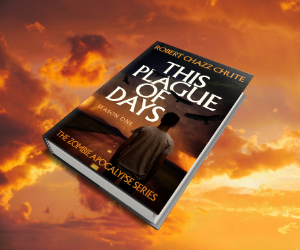
As we get through this pandemic together (and apart), I anticipated a bump in sales of my apocalyptic stuff. I write crime thrillers, too, but I’m better known for the sci-fi about our world’s end. AFTER Life is about a weaponized plague. In This Plague of Days, the first book is about where we are now: governments struggling to cope, systems breaking down, and people sheltering in place.
Though apocalyptical stories strike a chord with many readers, having “plague” in my titles has not boosted sales as expected. Those in isolation have more time to read, but perhaps they’re doing other things. Maybe they’re sleeping and eating more, bingeing Netflix or focusing on feel-good stories. A startling number of people seem to have taken up baking bread. Sure beats watching the news until depression kicks in.
I totally understand the impulse to retreat into comfort food and comfort media. When my kids were little and I was a stay-at-home dad, we watched iCarly together. I have a rather dark worldview. iCarly was a kids’ show with low stakes in which everything would always work out just fine. No threats, no death, no worries. Silliness can be an antidote to bad moods in tough times. A couple of nights ago, we watched Nailed It. It’s a show where amateur bakers are set up to fail with sometimes hilarious results. The show titled “Failure” was great for a laugh. I needed that.
With my palate thus cleansed, I went back to reading Weep by Eoin Brady, a zombie novel set in Ireland. I bought it because (a) I find the disaster genre interesting, and (b) Contagion, the prequel to This Plague of Days I’m writing, is also set in Ireland. Weep is clever. Mr. Brady writes well, with an elegant descriptive power that isn’t overdone. I suspect he’s worked in the hospitality industry for the little details that give his novel such an authentic context. One of the main characters reminds me of a prepper friend of mine, too. If zombies are your thing, I highly recommend Weep.
I wouldn’t enjoy stories of such doom and gloom as a steady diet, of course. (People who know me well would say, “Even Rob wouldn’t enjoy stories of such doom and gloom as a steady diet.”) Variety in all we consume makes for better nutrition for the body and mind.
That’s one of the reasons AFTER Life, Citizen Second Class, Amid Mortal Words and This Plague of Days contain hopeful notes (to varying degrees). I’m not interested in false hope or happily-ever-afters that don’t ring true. I prefer satisfying endings that linger with readers. And jokes. Surprise and defying mundane expectations is key to a good plot. It’s also required for a solid joke. In the brain tickle business, it’s fun to make your reader’s mind bounce around its bone case. Even amid utter mayhem, well-placed wit can take a story up to the next level. That’s a roller coaster ride readers want.
People read what they read for many reasons. Those reasons are often opaque to us. We simply like what we like. Recently, a kind reviewer included this note to her review of This Plague of Days, Season One:
One might ask why am I reading this book at this time. It’s like when I watched the “Exorcist” before going in for a job interview. My reality might have been scary had I not been prepared by scaring myself worse than a job interview. The series I know will be scarier than what I’m prepared to live through, should I survive this pandemic. Stay safe everyone.
If you feel the need to vary your media diet, please do so. It’s okay to protect your psyche and forego the news, for instance. Many of us finally have the time to get to our To-Be-Read piles. There’s plenty of room to enjoy all kinds of inky adventures. If you aren’t into end-of-the-world stories right now, check out The Night Man. Scary cover, sure. However, though it is not an unserious book, I packed a lot of jokes in there, too. Want a funny romp set in New York’s underworld in the ’90s? Try Brooklyn in the Mean TIme. There’s fun to be had in all kinds of escapes and we all need a break from existential dread, right?
Escapism comes in many forms. Enjoy what you enjoy.
Stay inside if you can.
Read what you want.
Love as much as possible.
~ Robert Chazz Chute writes science fiction, horror, and killer crime thrillers. 
Like this:
Like Loading...



